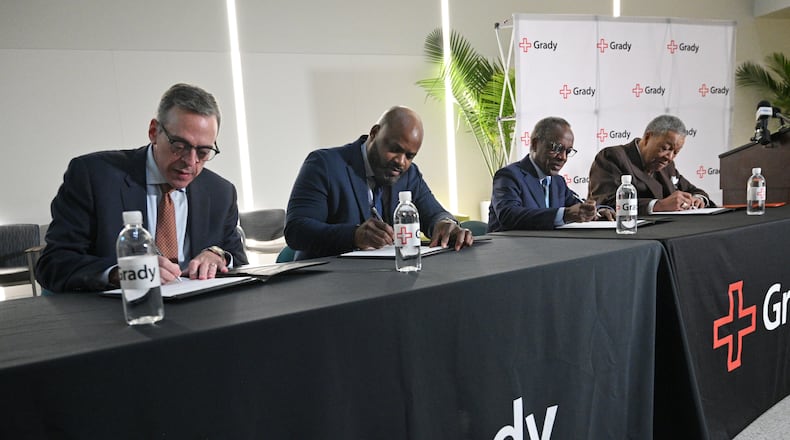Grady Memorial Hospital will expand its neighborhood clinics and other care in underserved areas of Fulton and DeKalb counties, under a new subsidy agreement between the hospital system, both counties and the Fulton-DeKalb Hospital Authority.
Leaders of all four gathered for a signing ceremony Tuesday morning just inside the hospital’s main entrance.
The agreement says Grady will open two new primary-care clinics in Fulton County and three in DeKalb, plus create mobile clinics for specific services.
In return, Fulton County will provide Grady with base funding of $43.3 million in 2024, while DeKalb County will provide base funding of about $19.1 million. Fulton will also pay debt service on Grady’s new surgical center, which opened in 2022.
In coming years, funding will shift and increase based on use of Grady services by each county’s residents and by the federal Consumer Price Index for medical care, which averages 3% annually.
The agreement runs for six years, with the option of two two-year renewals, for a total of 10 years.
The contract has been a year in the making, according to Fulton-DeKalb Hospital Authority CEO Jevon Gibson. Grady Health System President & CEO John Haupert described the talks as collegial.
“There was never a contentious moment, and we kept our eye on what needed to happen for months,” he said.
A key part of the new contract commits all parties to lobby the state to expand Medicare coverage to all households below 138% of the federal poverty line. If Medicaid expansion passes, the county would no longer subsidize Grady.
Credit: HYOSUB SHIN / AJC
Credit: HYOSUB SHIN / AJC
Fulton County Chairman Robb Pitts expressed hope that the General Assembly will “further expand health care access” during the new session. State expansion of Medicaid eligibility, which would allow receipt of millions in federal funds, tops local legislative priority lists.
The new agreement is a proactive response to the closure of two hospitals, the effects of the COVID-19 pandemic and the removal of more than 300,000 Georgians from Medicaid eligibility, DeKalb County CEO Michael Thurmond said. Throughout the pandemic, the requirement to annually renew enrollment in Medicaid was waived in exchange for additional federal funding, but that has ended.
The state is removing those who no longer qualify — or, in many cases, are unaware of the need to renew or unable to navigate the paperwork. The process, called “Medicaid unwinding,” will continue until June.
Grady makes medical care available to all Fulton and DeKalb residents, serving the uninsured, underinsured and indigent regardless of ability to pay. The hospital in downtown Atlanta provides emergency and indigent care for thousands of people in Fulton County, and its burden grew heavier last year with the closure by Wellstar Health System of the only two hospitals in Fulton County south of Interstate 20.
Wellstar Health System confirmed in December that it will shut down its last clinic in south Fulton on Jan. 12. The hospital system suggested patients go to the public clinic next door, Southside Medical Center. Wellstar is aiding Southside’s expansion and gradually paying it $5 million, with the expectation that the clinic will eventually support itself. Southside gets part of its funding from federal grants to care for the poor and uninsured.
The East Point clinic is all that remains of Wellstar’s former hospital there, Atlanta Medical Center-South. Wellstar shut down AMC-South in 2022. That was months before Wellstar made national news shutting down the main AMC hospital in downtown Atlanta.
A year ago Fulton County began studying the impact of the hospital closures, Pitts said.
The study found that many residents lack access to health care in the state’s most populous county, Pitts said. Health outcomes for racial minority populations are worse than for the White population; people in Fulton’s south half live an average of five years less than residents of the more affluent north, which has multiple hospitals and associated health infrastructure, he said.
Credit: HYOSUB SHIN / AJC
Credit: HYOSUB SHIN / AJC
“What we found was shocking in some ways, but in other ways simply underscored what we already knew,” Pitts said.
The situation in Fulton and DeKalb would be far worse without Grady, Pitts said.
Haupert said Grady officials knew the Wellstar closures would increase their volume of Level 1 trauma cases, and indeed saw a 35% increase in the first year. The hospital hired more staff to deal with the growth. Grady has 168 new inpatient beds opening soon, he said.
Other hospitals — Emory Midtown and Piedmont Atlanta — saw higher patient volumes too, Haupert said.
An analysis by the AJC showed that when AMC-South closed, the population that was removed from being 15 minutes away from an emergency room was overwhelmingly people with below-average income and 88.7% Black.
A joint study by Fulton County, Morehouse School of Medicine and consultants Ernst & Young found that southern Fulton has no specialists in cardiology, pulmonology or infectious diseases; and no doctors that care for patients with heart disease, respiratory diseases or HIV and AIDS. All those conditions are prevalent in the area’s 234,000 residents.
Fulton County commissioners and state legislators representing the area have called for federal investigation of AMC’s owner, Wellstar Health System over the closures.
Pitts said Tuesday he had no news on progress in seeking the investigation. County Manager Dick Anderson said he believes there will soon be a meeting among parties.
Grady has had operating agreements with local governments for 40 years, Haupert said.
Placing more primary and specialty care in communities, rather than centralized at the hospital, was a “key driver” of talks, Haupert said.
The clinics in Fulton County will be in the Cascade neighborhood at 3355 Cascade Road and Lee+White mixed-use center at 1000 White St. SW, both in Atlanta. The three DeKalb locations will be announced at the end of January. The openings will be staggered.
“The plan is to have the majority open in ‘24,” he said.
Credit: HYOSUB SHIN / AJC
Credit: HYOSUB SHIN / AJC
About the Author
Keep Reading
The Latest
Featured







